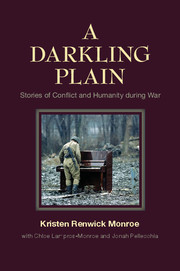Book contents
- Frontmatter
- Epigraph
- Contents
- Preface
- Introduction
- Part one War is a Terrible Thing!
- Part Two Guarding One’s Humanity During War: World War II
- Part Three Other Voices, Other Wars: From Indochina to Iraq
- Part Four Civil Wars and Genocides, Dictators and Domestic Oppressors
- 13 Grandfather Had his Head cut off
- 14 A Resistance to Keep You Alive
- 15 Stuck in the Mud in the Middle of a Civil War
- 16 Too Much was Seen
- 17 Care about other People
- 18 People Suffered Great Loss
- 19 Religion Mixed with Politics Creates Bad Things
- Part Five My Story, Your Choice How to Use it
- Conclusion
- Bibliography
- Acknowledgments by the Senior Author
- Index
13 - Grandfather Had his Head cut off
Rose and the Armenian Genocide
Published online by Cambridge University Press: 05 October 2014
- Frontmatter
- Epigraph
- Contents
- Preface
- Introduction
- Part one War is a Terrible Thing!
- Part Two Guarding One’s Humanity During War: World War II
- Part Three Other Voices, Other Wars: From Indochina to Iraq
- Part Four Civil Wars and Genocides, Dictators and Domestic Oppressors
- 13 Grandfather Had his Head cut off
- 14 A Resistance to Keep You Alive
- 15 Stuck in the Mud in the Middle of a Civil War
- 16 Too Much was Seen
- 17 Care about other People
- 18 People Suffered Great Loss
- 19 Religion Mixed with Politics Creates Bad Things
- Part Five My Story, Your Choice How to Use it
- Conclusion
- Bibliography
- Acknowledgments by the Senior Author
- Index
Summary
The series of events considered the first twentieth-century genocide took place against the Armenians before the word genocide was coined.
The Armenians emerged as a people in the sixth century bce in Eastern Anatolia. One of the first national groups to convert to Christianity in 301, Armenians had an independent country until 1375. Thereafter, Armenia was part of the Ottoman Empire. On most indicators, Armenians were a loyal minority in the empire until the late nineteenth century, when Christian minorities in the western part of the Ottoman Empire used Great Power support to achieve autonomy and independence. The first attacks on Armenians came in 1881, when 100 thousand to 200 thousand Armenians were killed – many in 1895 – and others were forcibly converted to Islam. The period between 1895 and 1922 is the controversial period, with dispute focusing on the genocidal intent of the Turkish government.
The core of what is classed as genocide by most scholars - while vehemently disputed by the Turkish government - began April 24, 1915, and emanated in Turkish fears of Armenian separatism and disloyalty toward the Ottomans during World War I. Armenian intelligentsia and civic leaders were deported and murdered. Armenians in the army were put to death. Military units attacked communities in the Armenian heartland. They killed the men, raped women, then kidnapped and raised children as Muslims. “Delegates” (murahhas) organized and supervised the deportation and massacre of departing Armenian convoys, usually in the deserted backlands, with “Special Organization” (Teskilatl Mahsusa) bands in charge of the killings. Armenians who survived the initial onslaught were subjected to further forced marches into the Syrian desert, where they were frequently killed.
- Type
- Chapter
- Information
- A Darkling PlainStories of Conflict and Humanity during War, pp. 191 - 198Publisher: Cambridge University PressPrint publication year: 2014



